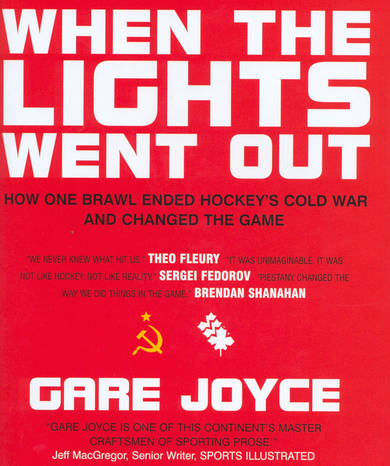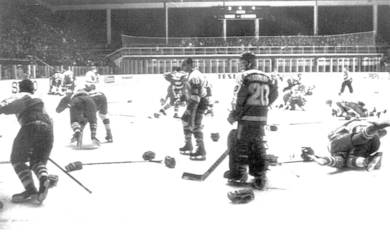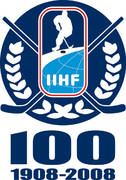

Story #34 The Piestany fiasco – Soviet Union and Canada disqualifiedJanuary 4, 1987 — Piestany, Czechoslovakia
The Canada-Soviet Union junior game on the night of January 4, 1987, in Piestany, Czechoslovakia, was supposed to decide the gold medal for the 1987 World Junior (U20) Championships. Unfortunately, the final night of the tournament lacked direct drama for both teams because only Canada could win gold.  The game started perfectly for Canada. Theo Fleury scored first, and although the Soviets tied the score just eleven seconds later, two goals before the horn gave Canada a solid 3-1 lead after 20 minutes. The teams exchanged goals midway through the second, but with the score 4-2 the game turned ugly. Soviet forward Pavel Kostichkin slashed Theo Fleury, and as the two pushed and shoved. After that both teams’ benches emptied and hell broke loose. In his book “When the lights went out”, written on the occasion of the 20-year anniversary of the infamous brawl in Piestany, Canadian journalist Gare Joyce can not definitely conclude who started it.  All players were suspended from international hockey for 18 months, although later the suspensions were rescinded. It was one of the darkest moments in IIHF history and many parties had to assume responsibility. The IIHF and the championship directorate for assigning a referee who was not capable to control a game at this level and the respective teams who were led by coaches who lacked in discipline and who were not able, or even not willing, to restrain their players. About the Top 100 StoriesAs part of the IIHF's 100th anniversary celebrations, www.IIHF.com is featuring the 100 top international hockey stories from the past century (1908-2008). Starting now and continuing through the 2008 IIHF World Championships in Canada, we will bring you approximately three stories a week counting down from Number 100 to Number 11.
The Final Top 10 Countdown will be one of the highlights of the IIHF's Centennial Gala Evening in Quebec City on May 17, the day prior to the Gold Medal Game of the 2008 World Championship.
These are the criteria for inclusion on this list: First, the story has to have had a considerable influence on international hockey. Second, it has to have had either a major immediate impact or a long-lasting significance on the game. Third, although it doesn't necessarily have to be about top players, the story does have to pertain to the highest level of play, notably Olympics, World Championships, and the like. The story can be about a single moment — a goal, a great save, a referee's call — or about an historic event of longer duration — a game, series, tournament, or rule change. |
 Click here for the 100 Top Stories
|
|






